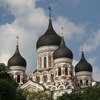Tallinn's 'Bronze Soldier' Involved in a New Conflict
Tensions between Estonia and Russia have been mounting since a bill was passed in the Estonian parliament on the protection of military cemeteries, allowing the remains of soldiers buried in unmarked graves to be transferred to clearly marked cemeteries. This new law, passed in accordance with the Geneva Convention (which forbids the burial of war victims in unmarked graves), also forbids the public display of Nazi and Soviet symbols.
Entangled at the heart of this matter is downtown Tallinn's 'Bronze Soldier' monument, a Soviet-era monument commemorating the Soviet soldiers who died "liberating" (or occupying, depending on who you talk to) Estonia. The new law would now allow for the removal of the Bronze Soldier from downtown Tallinn and the relocation of the memorial, and the dozen or so graves suspected to be underneath the monument, to a Soviet-era seaside military cemetery. Also currently being considered as of today in Estonian Parliament is a bill on the "removal of forbidden structures," which would ban "structures that glorify the occupation of the Republic of Estonia." Many Tallinn residents, both Russian and Estonian, view this bill as targeting the disputed Bronze Soldier directly.
Originally erected in 1947, the Bronze Soldier long served as a sort of "tomb of the unmarked soldier," replete with burning "eternal flame;" however since the fall of the Soviet Union (1990), the monument (one of the only of its kind to survive in Estonia - due mainly to the protest of Tallinn's Russian population) has been a great source of contention. Not only is it the site of annual Victory Day celebrations, but the Bronze Soldier has become a rallying point for Russian nationalists and the site of sometimes-violent clashes between ethnic Russians and Estonians.
Many Estonians are offended by the monument's presence in the centre of Tallinn, objecting to its tribute to the Soviet Army, because the Soviet Army was an occupying force for many, many years in Estonia. German occupation of Estonia ended in 1944 when the Estonians were 'liberated' by the Soviets, however many view that year as simply a transition between two occupying armies which marked the start of decades of oppressive communist rule. To most Estonians, both the German and Soviet occupations represent the same kind of totalitarian regime.
The Russian government has been absolutely outraged over the new Estonian legislation, calling it "an attempt to legalize fascism" and the "rehabilitisation of Nazism." They believe the legislation shows an utter lack of respect toward the liberators and Putin has made comments suggesting the act is a political power play to gain favor within the EU. In response to the new bill, Russia has repeatedly threatened Estonia with economic sanctions, and large demonstrations have been occurring all week in Russia (under the slogan, "Hitler is a hero of Estonia") encouraging the government to put these economic sanctions in place. The Estonian ambassador to Russia, Marina Kaljurand, has repeatedly explained that the new law was not drawn to target any particular structure, but to "fill a legal vacuum." Kaljurand says Estonia is prepared and unintimidated by possible Russian sanctions, pointing out that Estonia's trade turnover with Russia is only 10% of the country's total foreign trade turnover. "We will have to put up with it," Kaljurand remarked. For now, the future of the Bronze Soldier is unclear, as there are a few more details to be worked out before the bill is officially voted in.





